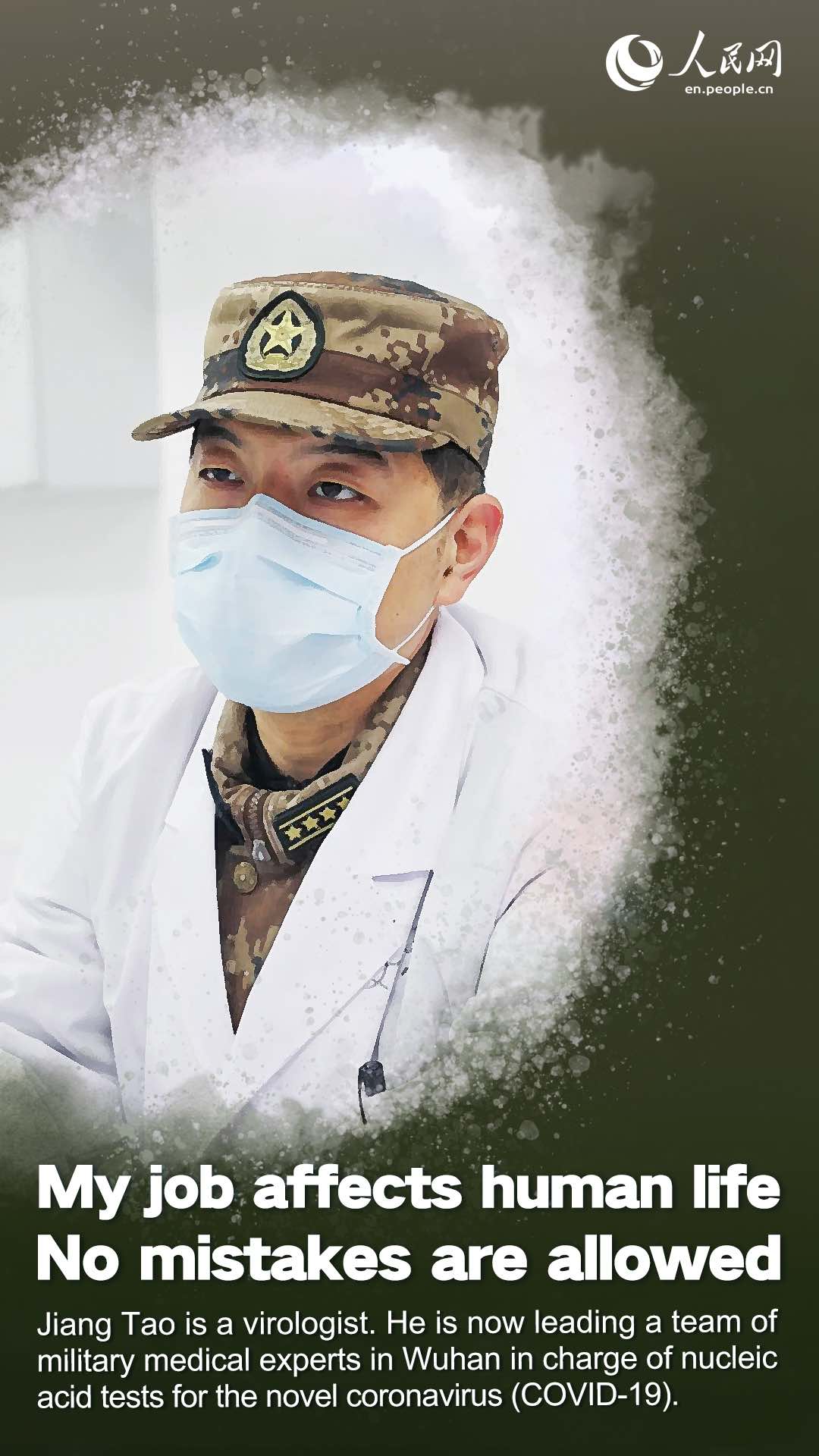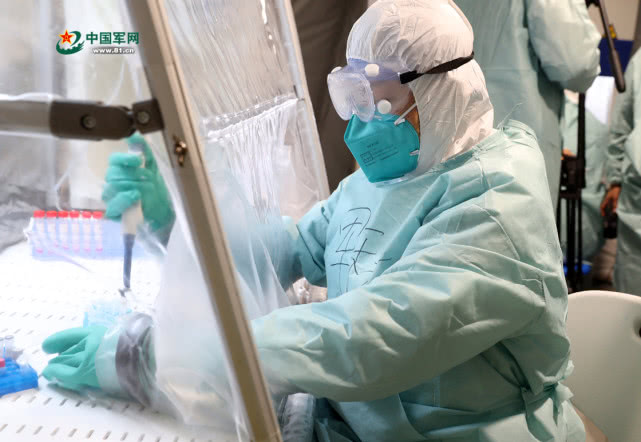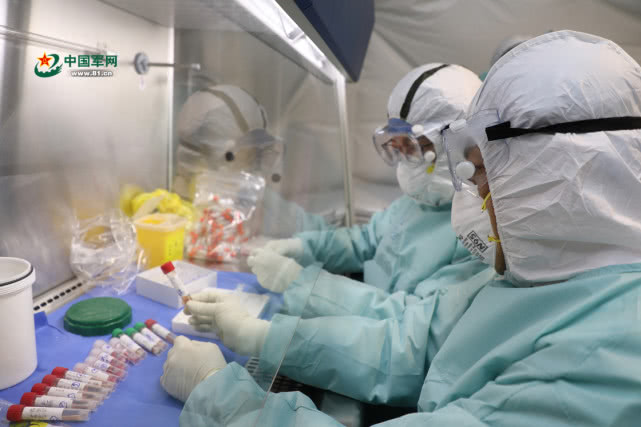


Man's dearest possession is life. It is given to him but once, and he must live it so as to feel no torturing regrets for wasted years, never know the burning shame of a mean and petty past.
——Nicolai Ostrovsky, How the Steel Was Tempered
Before dawn breaks, Wuhan is still and fast asleep. But at one laboratory of the General Hospital of the Central Military Region, a slightly weary man reviews his last coronavirus test result, and solemnly signs his name on the test report.
His name is Jiang Tao, a virologist currently leading a team of military medical experts in Wuhan in charge of nucleic acid tests for the novel coronavirus (COVID-19).
As an experienced “virus fighter” who has been to Africa four times to help fight the Ebola virus, Jiang felt duty bound to go to the front line and take up the most difficult of posts after the coronavirus swept the country.
A challenging mission

Jiang Tao handles a sample in a glovebox. (Photo/81.cn)
A nucleic acid test is one of the most important methods used to identify cases of coronavirus infection.
Jiang joined the battle shortly after the outbreak began in the city of Wuhan, leading his team to set up a nucleic acid testing platform overnight in a makeshift lab.
Jiang’s team was asked to make test results available in 24 hours. But his team made great efforts to shorten the time and produce results even faster. The team is now able to complete over 90 tests in one hour, and can carry out over 500 tests per day.
“Behind each and every sample tube, which seems cold and lifeless, are the lives of patients. The sooner the results come out, the better for the patients,” Jiang said.

Jiang Tao (R) deals with nucleic acid samples. (Photo/81.cn)
The nucleic acid test is a tedious task fraught with unknown risks, and every step must be carried out carefully.
He clearly remembers the time when he was sent to Africa to combat Ebola. Due to irregular sampling standards in local hospitals, sharp objects like needles and broken glass were sometimes mixed up with samples in the sample package, putting the medics at risk of becoming infected if the objects pierced their gloves.
And there are even greater risks than that. During the transportation of throat swab samples, rides on bumpy roads could cause sealing nuts to loosen and the virus to leak, greatly increasing their risk of infection.
Because of all these risks, Jiang always repeatedly tells his colleagues before each test to protect themselves and pay attention to sharp objects as they receive and handle samples.
"My job affects human life. No mistakes are allowed,” Jiang said.
Overseas veteran
As an expert in respiratory diseases, Jiang Tao has taken part in many battles against epidemics. Jiang once helped with the development of the SARS vaccine, and established a monitoring and warning system for acute respiratory infectious diseases.
Jiang’s contribution is not limited to China. He has also been to Liberia, Sierra Leone and other virus-hit African countries to assist with epidemic prevention and control efforts.
When Jiang was young, he had a feeling that viruses, though tiny and inanimate, might not be easy to control completely, prompting him to switch his career from industrial microbiology to a relatively unpopular domain -- infectious diseases.
Since 2003, he has spent about 200 days per year in the laboratory, and is now accustomed to the state of hypoxia and the marks left on his face due to long periods of time wearing a mask.

Jiang Tao (C) and his colleagues give a thumbs up. (Photo/81.cn)
With more and more infectious diseases threatening people's lives and health in recent years, Jiang felt the pressure on him mounting. He wanted to do his utmost to upgrade the technology and to improve the prevention and control system against diseases.
Jiang is fearless in the face of diseases, but is always concerned about his wife and son.
"After we got married, he was sent to Liberia. I was pregnant when he left and our son was four months old when he came back,” Jiang's wife Sun Ying recalled. As a result, she named her son Fei Fei (meaning “Africa” in Chinese) to remember this experience.
Jiang has promised his family that when the epidemic is over, he will take them to Wuhan to see the Wuhan Yangtze River Bridge and Yellow Crane Tower and tell them about his experience fighting against the epidemic.

 Award-winning photos show poverty reduction achievements in NE China's Jilin province
Award-winning photos show poverty reduction achievements in NE China's Jilin province People dance to greet advent of New Year in Ameiqituo Town, Guizhou
People dance to greet advent of New Year in Ameiqituo Town, Guizhou Fire brigade in Shanghai holds group wedding
Fire brigade in Shanghai holds group wedding Tourists enjoy ice sculptures in Datan Town, north China
Tourists enjoy ice sculptures in Datan Town, north China Sunset scenery of Dayan Pagoda in Xi'an
Sunset scenery of Dayan Pagoda in Xi'an Tourists have fun at scenic spot in Nanlong Town, NW China
Tourists have fun at scenic spot in Nanlong Town, NW China Harbin attracts tourists by making best use of ice in winter
Harbin attracts tourists by making best use of ice in winter In pics: FIS Alpine Ski Women's World Cup Slalom
In pics: FIS Alpine Ski Women's World Cup Slalom Black-necked cranes rest at reservoir in Lhunzhub County, Lhasa
Black-necked cranes rest at reservoir in Lhunzhub County, Lhasa China's FAST telescope will be available to foreign scientists in April
China's FAST telescope will be available to foreign scientists in April